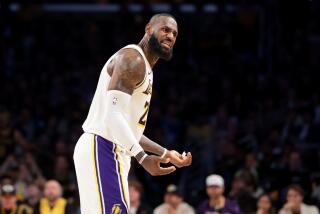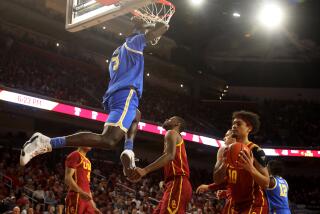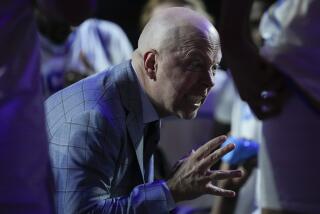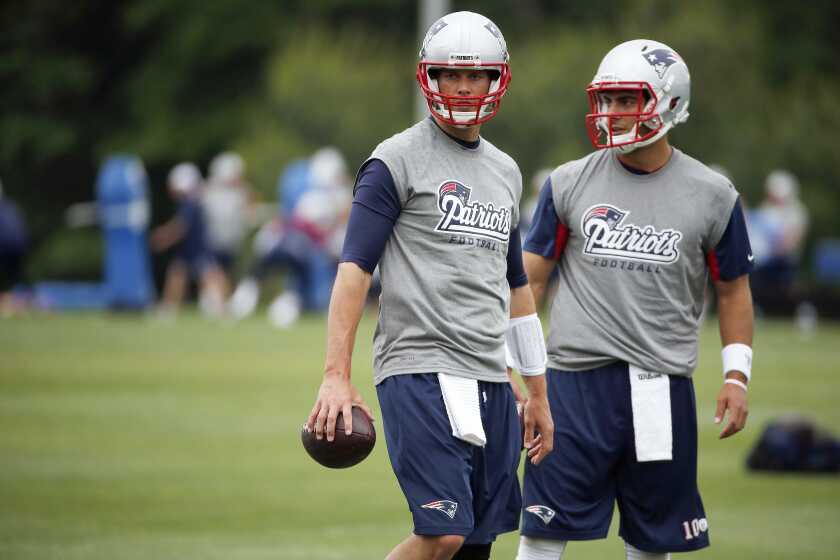Column: Jack Jablonski is achieving his goals through optimism and sheer determination
Jack Jablonski likes to say he understands the injury he suffered when he was driven face-first into the boards in a high school hockey game in 2011, a hit that broke two of his vertebrae and severed his spinal cord, but he will never accept the finality of his paralysis or the pessimism of his doctors’ prognoses.
He has already defied them by activating muscles in his glutes, hamstrings and hip flexors and by occasionally wiggling his toes, movements that tell him the connections between his brain and his muscles are still there. He believes he will walk again, and he regularly pushes himself through physical therapy to transform his vision into reality.
Yet, while he could picture himself walking, he couldn’t picture himself finishing college. “It honestly felt like that day would never be here,” he said.
Jablonski left his native Minnesota to enroll at USC midway through the 2014-15 academic year. He knew no one in Los Angeles and knew little about the campus, but his outgoing personality helped him build a strong network of friends. Majoring in communications and working for the Kings as an intern expanded his world even more and put him in position to launch a promising hockey-related career.
And a little more than a week ago, he topped it off by wearing a cardinal-and-gold stole around his neck that proclaimed him a member of the Class of 2019.
“It’s hard to fathom, but here we are,” he said. “All of it is pretty much wrapped up, which is crazy to think.”
He acknowledged he couldn’t have done it without support from the Physically Challenged Athletes Scholarship Fund of the Swim With Mike Foundation. The foundation, named for paralyzed former Trojans swimmer Mike Nyeholt, has raised more than $24 million and enabled 250 physically challenged student-athletes to continue their education at 130 universities.
The scholarship is a lifeline, allowing people to rebuild shattered lives. “What they’ve done for me and hundreds of others across the nation, I’m just one of the many stories,” Jablonski said.
His story is just beginning. Having conquered the day-to-day challenges that kept him from looking too far ahead, he now can look forward with enhanced optimism.
“Just the logistics of living with paralysis on a college campus and knowing that I can’t be independent was a big barrier moving forward once I got to college, and then on top of that, being halfway across the country was definitely another factor,” he said of why graduation seemed a remote concept. “It’s something I never thought would happen in 2011 and 2012. And now that I’ve done it, it’s just crazy to think that I’ve been able to overcome so much and be able to use everyone’s support and everyone’s helping hands to get to somewhere that I never would have thought about.”
Ron Orr, founder and executive director of Swim With Mike, said the organization was thrilled by Jablonski’s achievement. “He embodies the Swim With Mike mission,” Orr said. “He will always have the support of the Swim With Mike family.”
Sign up for our daily sports newsletter »
Jablonski, 23, returned to Minnesota last week to rest for a few days before beginning intense physical therapy at a NeuroRecovery Network facility hear his home. He will spend 12 to 15 hours a week doing therapy, a chunk of time he couldn’t carve out in Southern California because of his classes and his work with the Kings. He underwent baseline assessments last week that will gauge his status and determine how to proceed.
“The biggest thing is about staying in shape physically so that when the technological advancements do come for people with paralysis to benefit from them, that I’m in shape physically and mentally so that I can best use that technological advancement,” he said.
He’s still able to occasionally move his toes, but not consistently. “The mentally frustrating thing about paralysis is that while there are continuous improvements, whether it be in muscle mass or being able to physically gain X, Y and Z back, it’s not always there. It comes and goes,” he said. “So it kind of plays with you mentally, because one day you’ve had it and it’s a great breakthrough, and then the next day, you think you’ve got it and all of a sudden it’s just not there.”
But he’s encouraged that he has activating muscles in his lower body. “The muscles are flexing and clenching, which is great because if that’s there, then obviously there’s more to come,” he said.
Before he left Los Angeles, Jablonski met with Kelly Cheeseman, the Kings’ chief operating officer, to discuss what’s next for him. They attended the same high school — Benilde-St. Margaret’s in St. Louis Park, Minn. — and Cheeseman has been a constant mentor. They agreed Jablonski has a bright future in hockey even if it isn’t on the ice, as he’d hoped before his catastrophic accident on Dec. 30, 2011.
Jablonski’s excellent work on the Kings’ podcasts hint that he could have a solid media career, and Cheeseman suggested he could provide content for the team’s audio network on iHeart Radio. “He’s opened up a lot of people’s eyes across the organization at how polished and knowledgeable he is,” Cheeseman said. “He’s a special kid.”
Jablonski isn’t sure which direction to go, but he’s happy to have choices he wasn’t sure would be open to him. “Back when I was playing hockey I was a player who had an impact on how the game would evolve, and that passion is still there,” he said. “I really want to be a part of having an impact on the ice, obviously not directly, because I can’t be on the ice, but indirectly.
“Being able to understand how the game works on the hockey operations side is a passion of mine that I hope to keep pursuing.”
It’s easy to see him doing that. Or reaching any other goal he sets.
More to Read
Go beyond the scoreboard
Get the latest on L.A.'s teams in the daily Sports Report newsletter.
You may occasionally receive promotional content from the Los Angeles Times.











